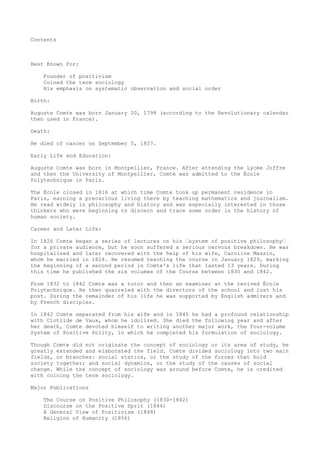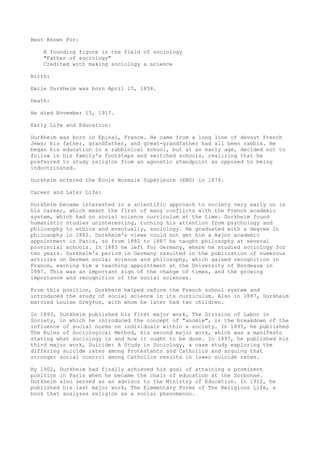Cielo
- 1. Negative exponents are exactly what they are named; they are exponents that happen to be negative. 2^-3 In mathematics, this is not proper form for writing a number with an exponent, so the expression must be rewritten in its proper form. null The best way to remember how to deal with a negative exponent is to remember that negative is the opposite of positive and division is the opposite of multiplication, so a number with a negative exponent should be moved to the denominator of a fraction and the exponent switched to positive. The opposite is also true. If the negative exponent is in the denominator of a fraction, its expression gets moved to the numerator and the sign of the exponent is changed. That way 2^-3 becomes 1/2^3 What about something more complicated? -5y^-3 z^5 becomes -5z^5/y^3 And 2x^-3/y^2 z^-2 is 2z^2/x^3 y^2 Isidore Auguste Marie Fran├¦ois Xavier Comte (19 January 1798 ŌĆō 5 September 1857), better known as Auguste Comte (French: [ogyst k?~t]), was a French philosopher. He was a founder of the discipline of sociology and of the doctrine of positivism. He is sometimes regarded as the first philosopher of science in the modern sense of the term.[2] Influenced by the utopian socialist Henri Saint-Simon, Comte developed the positive philosophy in an attempt to remedy the social malaise of the French Revolution, calling for a new social doctrine based on the sciences. Comte was a major influence on 19th-century thought, influencing the work of social thinkers such as Karl Marx, John Stuart Mill, and George Eliot.[3] His concept of sociologie and social evolutionism set the tone for early social theorists and anthropologists such as Harriet Martineau and Herbert Spencer, evolving into modern academic sociology presented by ├ēmile Durkheim as practical and objective social research. Comte's social theories culminated in the "Religion of Humanity", which influenced the development of religious humanist and secular humanist organizations in the 19th century. Comte likewise coined the word altruisme (altruism).[4]
- 2. Contents Best Known For: Founder of positivism Coined the term sociology His emphasis on systematic observation and social order Birth: Auguste Comte was born January 20, 1798 (according to the Revolutionary calendar then used in France). Death: He died of cancer on September 5, 1857. Early Life and Education: Auguste Comte was born in Montpellier, France. After attending the Lyc├®e Joffre and then the University of Montpellier, Comte was admitted to the ├ēcole Polytechnique in Paris. The ├ēcole closed in 1816 at which time Comte took up permanent residence in Paris, earning a precarious living there by teaching mathematics and journalism. He read widely in philosophy and history and was especially interested in those thinkers who were beginning to discern and trace some order in the history of human society. Career and Later Life: In 1826 Comte began a series of lectures on his ŌĆ£system of positive philosophyŌĆ£ for a private audience, but he soon suffered a serious nervous breakdown. He was hospitalized and later recovered with the help of his wife, Caroline Massin, whom he married in 1824. He resumed teaching the course in January 1829, marking the beginning of a second period in Comte's life that lasted 13 years. During this time he published the six volumes of the Course between 1830 and 1842. From 1832 to 1842 Comte was a tutor and then an examiner at the revived ├ēcole Polytechnique. He then quarreled with the directors of the school and lost his post. During the remainder of his life he was supported by English admirers and by French disciples. In 1842 Comte separated from his wife and in 1845 he had a profound relationship with Clotilde de Vaux, whom he idolized. She died the following year and after her death, Comte devoted himself to writing another major work, the four-volume System of Positive Polity, in which he completed his formulation of sociology. Though Comte did not originate the concept of sociology or its area of study, he greatly extended and elaborated the field. Comte divided sociology into two main fields, or branches: social statics, or the study of the forces that hold society together; and social dynamics, or the study of the causes of social change. While the concept of sociology was around before Comte, he is credited with coining the term sociology. Major Publications The Course on Positive Philosophy (1830-1842) Discourse on the Positive Sprit (1844) A General View of Positivism (1848) Religion of Humanity (1856)
- 3. Best Known For: A founding figure in the field of sociology "Father of sociology" Credited with making sociology a science Birth: Emile Durkheim was born April 15, 1858. Death: He died November 15, 1917. Early Life and Education: Durkheim was born in Epinal, France. He came from a long line of devout French Jews; his father, grandfather, and great-grandfather had all been rabbis. He began his education in a rabbinical school, but at an early age, decided not to follow in his family's footsteps and switched schools, realizing that he preferred to study religion from an agnostic standpoint as opposed to being indoctrinated. Durkheim entered the ├ēcole Normale Sup├®rieure (ENS) in 1879. Career and Later Life: Durkheim became interested in a scientific approach to society very early on in his career, which meant the first of many conflicts with the French academic system, which had no social science curriculum at the time. Durkheim found humanistic studies uninteresting, turning his attention from psychology and philosophy to ethics and eventually, sociology. He graduated with a degree in philosophy in 1882. Durkheim's views could not get him a major academic appointment in Paris, so from 1882 to 1887 he taught philosophy at several provincial schools. In 1885 he left for Germany, where he studied sociology for two years. Durkheim's period in Germany resulted in the publication of numerous articles on German social science and philosophy, which gained recognition in France, earning him a teaching appointment at the University of Bordeaux in 1887. This was an important sign of the change of times, and the growing importance and recognition of the social sciences. From this position, Durkheim helped reform the French school system and introduced the study of social science in its curriculum. Also in 1887, Durkheim married Louise Dreyfus, with whom he later had two children. In 1893, Durkheim published his first major work, The Division of Labor in Society, in which he introduced the concept of "anomie", or the breakdown of the influence of social norms on individuals within a society. In 1895, he published The Rules of Sociological Method, his second major work, which was a manifesto stating what sociology is and how it ought to be done. In 1897, he published his third major work, Suicide: A Study in Sociology, a case study exploring the differing suicide rates among Protestants and Catholics and arguing that stronger social control among Catholics results in lower suicide rates. By 1902, Durkheim had finally achieved his goal of attaining a prominent position in Paris when he became the chair of education at the Sorbonne. Durkheim also served as an advisor to the Ministry of Education. In 1912, he published his last major work, The Elementary Forms of The Religious Life, a book that analyzes religion as a social phenomenon.
![Negative exponents are exactly what they are named; they are exponents that
happen to be negative.
2^-3
In mathematics, this is not proper form for writing a number with an exponent,
so the expression must be rewritten in its proper form.
null
The best way to remember how to deal with a negative exponent is to remember
that negative is the opposite of positive and division is the opposite of
multiplication, so a number with a negative exponent should be moved to the
denominator of a fraction and the exponent switched to positive. The opposite is
also true. If the negative exponent is in the denominator of a fraction, its
expression gets moved to the numerator and the sign of the exponent is changed.
That way
2^-3
becomes
1/2^3
What about something more complicated?
-5y^-3 z^5
becomes
-5z^5/y^3
And
2x^-3/y^2 z^-2
is
2z^2/x^3 y^2
Isidore Auguste Marie Fran├¦ois Xavier Comte (19 January 1798 ŌĆō 5 September
1857), better known as Auguste Comte (French: [ogyst k?~t]), was a French
philosopher. He was a founder of the discipline of sociology and of the doctrine
of positivism. He is sometimes regarded as the first philosopher of science in
the modern sense of the term.[2]
Influenced by the utopian socialist Henri Saint-Simon, Comte developed the
positive philosophy in an attempt to remedy the social malaise of the French
Revolution, calling for a new social doctrine based on the sciences. Comte was a
major influence on 19th-century thought, influencing the work of social thinkers
such as Karl Marx, John Stuart Mill, and George Eliot.[3] His concept of
sociologie and social evolutionism set the tone for early social theorists and
anthropologists such as Harriet Martineau and Herbert Spencer, evolving into
modern academic sociology presented by ├ēmile Durkheim as practical and objective
social research.
Comte's social theories culminated in the "Religion of Humanity", which
influenced the development of religious humanist and secular humanist
organizations in the 19th century. Comte likewise coined the word altruisme
(altruism).[4]](https://image.slidesharecdn.com/cielo-150718130127-lva1-app6891/85/Cielo-1-320.jpg)

